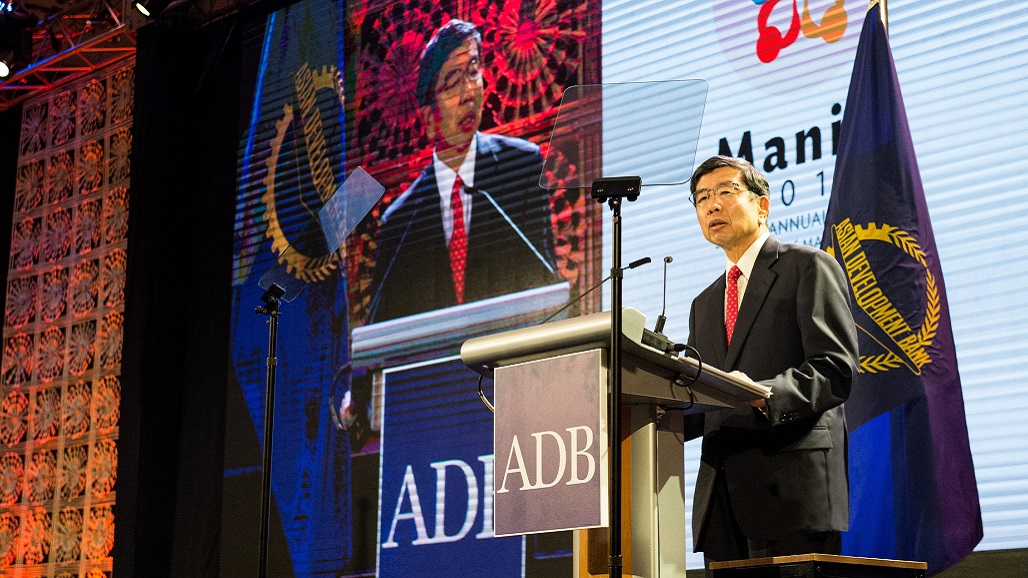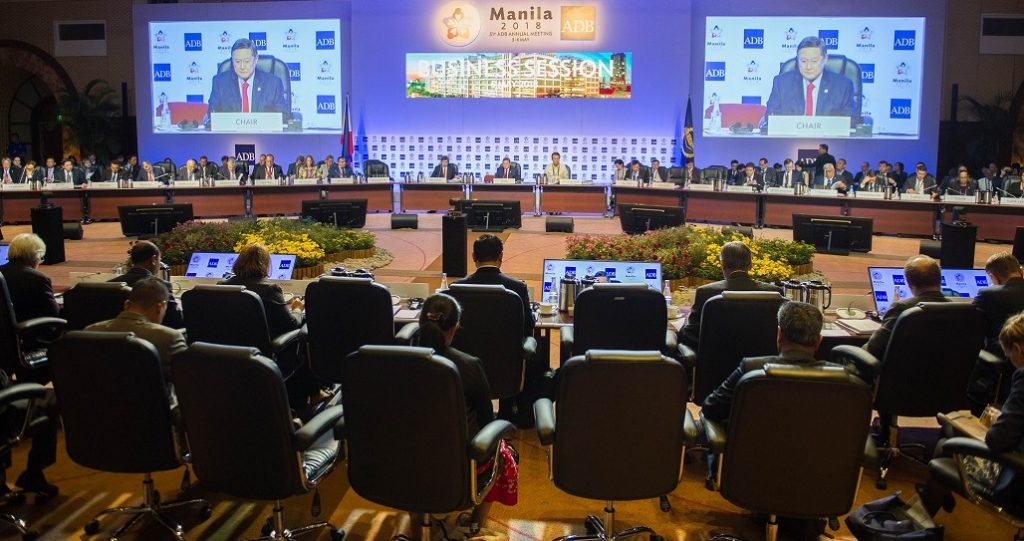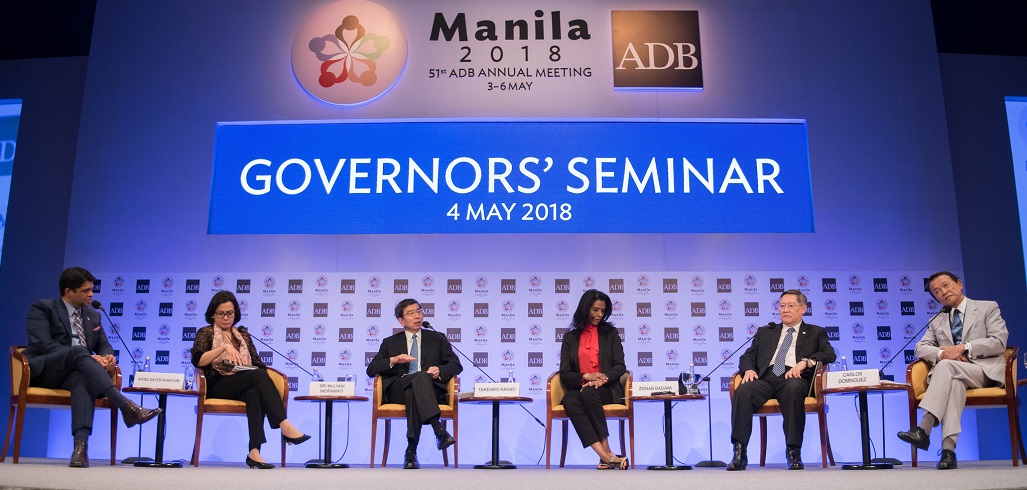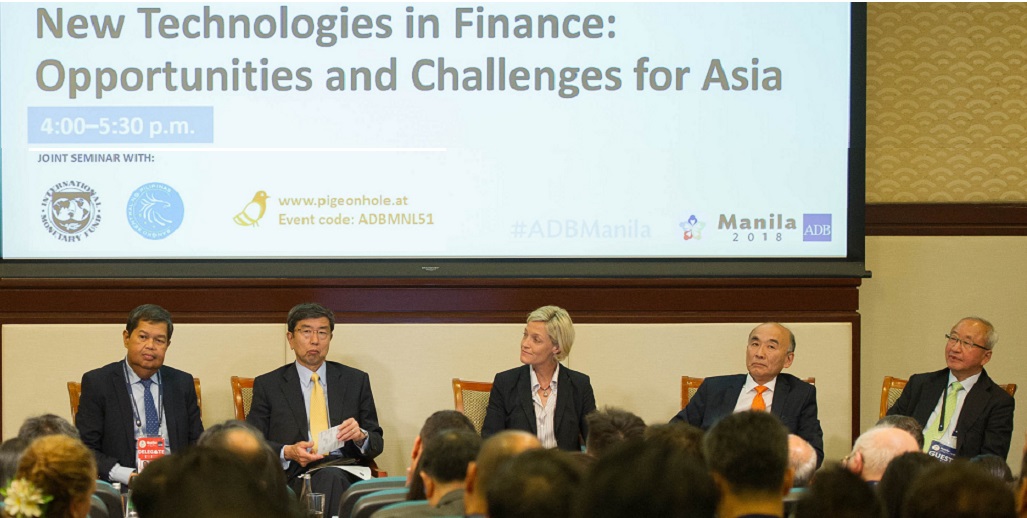Manila – Representatives from ABA member banks and the ABA Secretariat joined other delegates who attended the 51st Annual Meeting of the Board of Governors of the Asian Development Bank (ADB) held on May 3-6, 2018 at the ADB Headquarters in Manila, Philippines.
Numbering some 4,600, the attendees came from ADB’s 67 member countries -government officials, business leaders, academics, journalists, and representatives from civil society and development organizations. The ABA Secretariat was represented by Deputy Secretary Mr. Amador R. Honrado Jr.
During the past 11 years, the ADB has accredited the ABA as a Guest Association in the Annual Meetings of its Board of Directors: in Yokohama, Japan (2017); in Frankfurt, Germany (2016); Baku, Azerbaijan (2015); Astana, Kazakhstan (2014); New Delhi (2013); Manila (2012); Hanoi (2011); Tashkent (2010); Bali (2009); Madrid (2008); Kyoto (2007); Hyderabad (2006); and Istanbul (2005).
I. Highlights of the Manila Meeting
Focusing on the theme “Linking People and Economies for Inclusive Development,” this year’s ADB meeting in Manila examined global and regional issues affecting development in Asia and the Pacific, with the delegates and participants discussing and exchanging ideas on ADB’s Strategy 2030 to “achieve a prosperous, inclusive, resilient, and sustainable Asia and the Pacific.”
Various seminars and events were held during the Annual Meeting. Topics include: (a) examining the effect of new technologies and globalization on jobs and how countries can prepare; (b) addressing gender gaps in the region through women’s entrepreneurship and economic empowerment; (c) mobilizing private sector resources in meeting Asia’s huge infrastructure needs; (d) adapting new technologies in finance; (e) investing in community-led solutions for climate and disaster resilience; and (f) promoting inclusive growth through regional cooperation.
The host country event also featured sessions on: (a) Silk Roads and Beyond; (b) Saving the International Economic Order; and (c) Financial Technology for Inclusion.
II. Summary of Meeting sessions
Opening Session
In his Opening Address at the Meeting, ADB President Takehiko Nakao said Strategy 2030 will address existing and emerging challenges. “There is still persistent poverty,” said Mr. Nakao. “We must address rising inequality, growing environmental pressures, and rapid urbanization. Aging in some countries and an increasing youth population in others present opportunities as well as challenges.” Strategy 2030 will be aligned with the international agenda, including the Sustainable Development Goals and the Paris Agreement on climate change.
President Nakao highlighted the 10 priorities of Strategy 2030, namely: (1) tackle remaining poverty and increasing inequalities in Asia and the Pacific; (2) accelerate progress in gender equality; (3) scale up support to combat climate change, build climate and disaster resilience, and enhance environmental sustainability; (4) build livable cities that are competitive, green, resilient, and inclusive; (5) promote rural development and food security; (6) strengthen governance; (7) foster regional cooperation and integration; (8) mobilize private sector resources to meet the region’s huge development financing needs; (9) further strengthen ADB’s role as a provider and facilitator of knowledge; and (10) pursue a stronger, better, and faster ADB.
“We will continue to use our financial resources efficiently and creatively,” Mr. Nakao said. “We will invest in our workforce, promote diversity including gender balance, and ensure a respectful workplace. We will expand our presence on the ground. We will dramatically modernize business processes to speed up our services to clients,” he added.
Seminar Sessions
A number of seminars were held during the course of the three-day event. These included the following:
(a) Tapping Technology to Maximize Longevity Dividend in Asia – The seminar featured panelists who shared their views on how aging societies can explore and harness the potential of new technology, national policy, and regional collaboration options to reap the benefits of longevity.
(b) Private Sector Participation in Asian Infrastructure Development – The panelists discussed factors that drive private sector interest in particular PPP markets, explored steps that developing countries can take to attract private capital, and identify PPP markets in Asia and the Pacific region that are expected to be most attractive for the private sector in the near term.
(c) Asia’s Emergence in the New World Order: Growth, Integration, and Resilience – The seminar discussed how economies in the ASEAN + 3 region could unleash their growth potential to enhance their productivity and continue with the rapid pace of catch-up over the past few decades. It also provided an opportunity to better understand the emerging challenges faced by the region, as well as benefits from new opportunities in the new world order.
(d) Investing for a Sustainable Future: The Search for Sustainable Long-Term Investment Returns – The seminar featured a panel of experts who reviewed developments in sustainable finance and local currency bonds. They also discussed the need for sustainable long-term investment return to support growing urbanization and trade.
(e) The Way Forward on Global Trade Imbalances – The session examined the substantial progress that has been achieved since the early 2000s in addressing global imbalances and exchange rate misalignment. Panelists also examined rising populism around the works and what steps, if any, need to be taken to further re-balance global trade and promote equitable economic development around the world.
(f) Breaking Barriers: Women Entrepreneurs in Asia and the Pacific – The seminar discussed challenges and successes experienced by women;s entrepreneurship in the Asia-Pacific region. Panelists shared their views on: (a) initiatives for overcoming multiple barriers to success faced by women entrepreneurs; (b) key contributing factors related to policy context, financial mechanisms, training, and networking, and (c) steps to accelerate support to women start-ups and entrepreneurs.
(g) New Technologies in Finance: Opportunities and Challenges for Asia – The seminar featured panelists who reviewed Asia’s recent progress in financial market development, discussed key issues and challenges for Asia stemming from new technologies in finance, and examined policy options for maximizing their benefits while limiting their disadvantages.
(h) Past, Present, and Future of the World Economy – Distinguished speakers looked back to the past with a new understanding, examined the relevance of key structures of the present global financial system, and explored how multilateral institutions and government can adapt by harnessing opportunities while navigating the hazards of a digital future.
(i) CNBC Debate: Technology for Change – Panelists addressed questions such as where will the next technological advancement come from; how will it benefit society and what investment opportunity does it provide; what investment is needed to make innovation the engine of economic growth.
(j) Governor’s Seminar: Technological Change, Globalization, and Jobs in Asia – ADB Governors shared their views on how new technologies and inward oriented sentiments regarding globalization are affecting the prospects for job creation in developing Asia. Discussions also focused on the policy responses needed for harnessing new technologies and shifting patterns of globalization for shared prosperity.
III. Launching of the Report on “ASEAN + 3 Regional Economic Outlook 2018
The ASEAN +3 Macroeconomic Research Office (AMRO) launched its “ASEAN + 3 Regional Economic Outlook 2018” report focusing on the region’s economic prospects, and a thematic study on “Resilience and Growth in a Changing World.” The Report notes that the economic outlook has improved across ASEAN + 3 economies, boosted by favorable global conditions in 2018. However, the region faces significant external risks such as trade protectionism, a faster than expected tightening in global financial conditions, production networks, technology and demographic challenges.






Leave a Reply